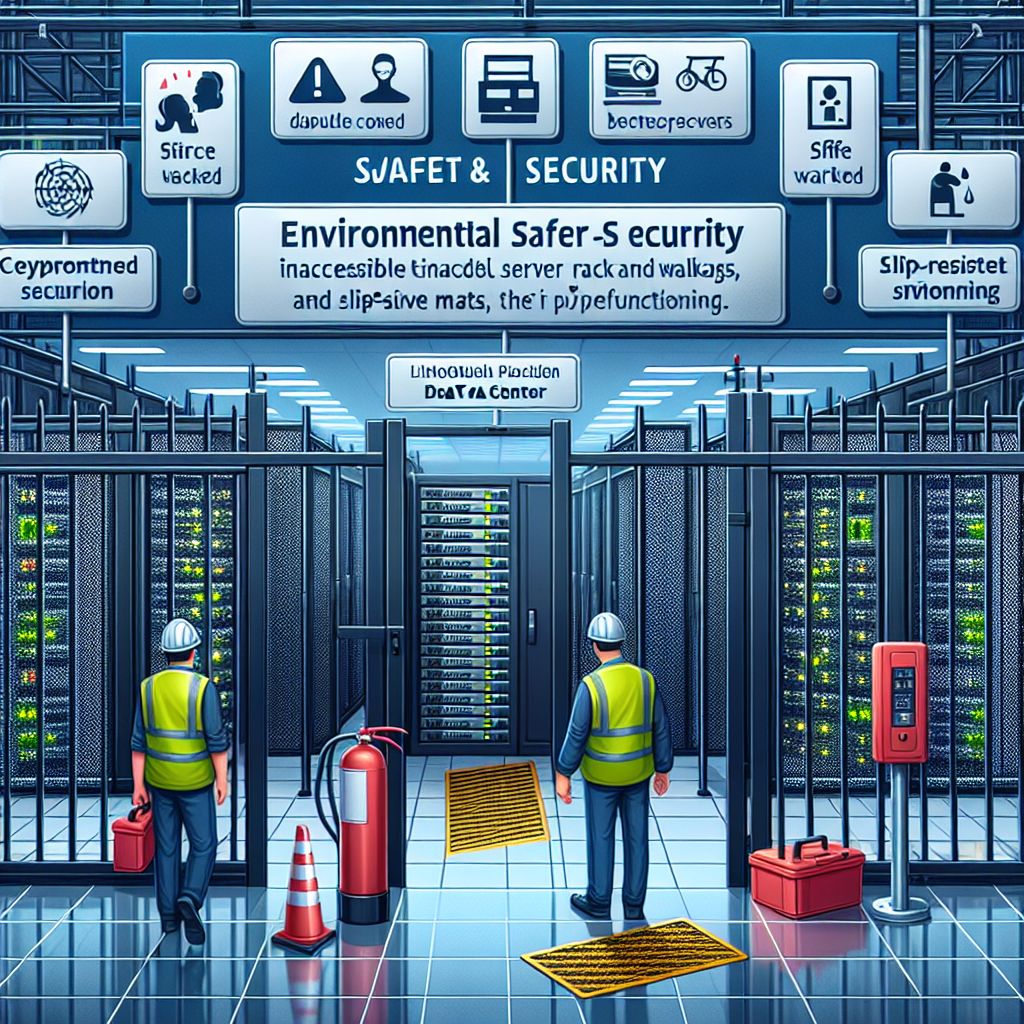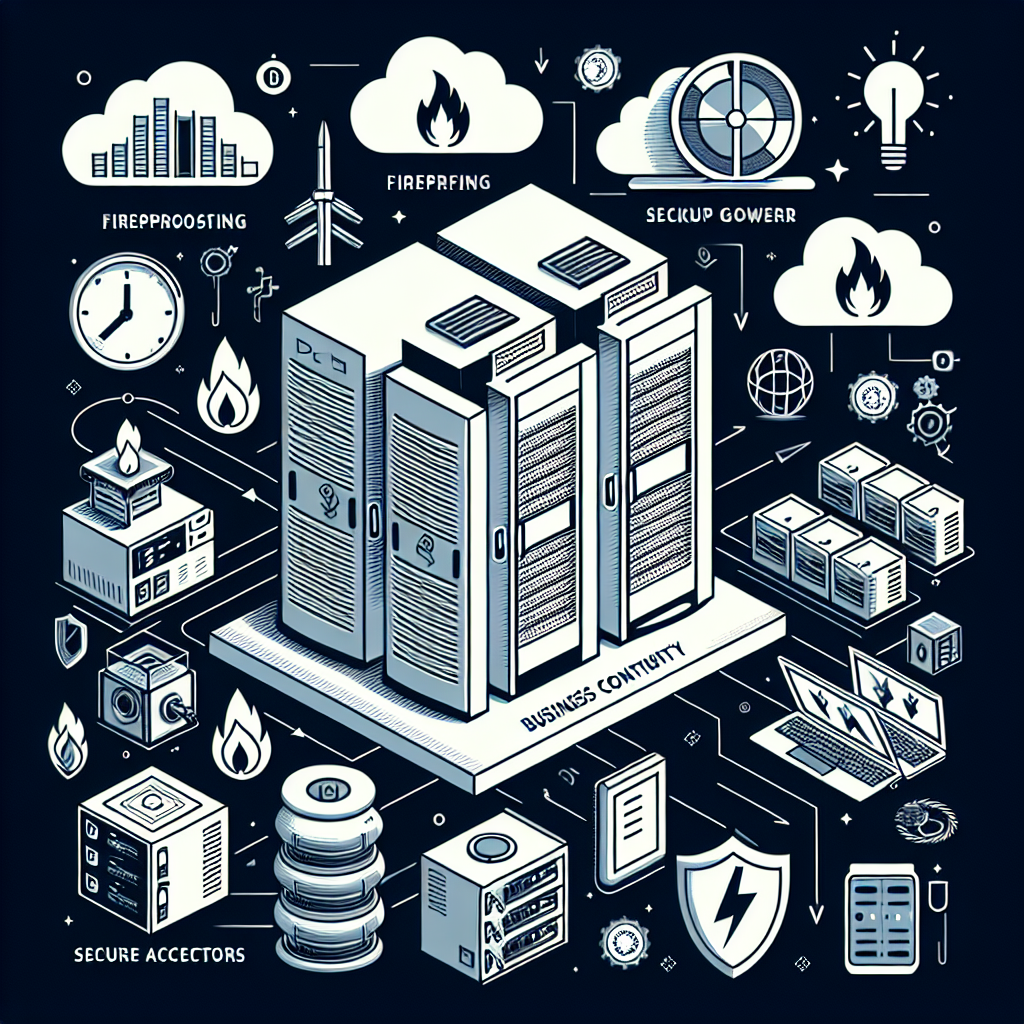Your cart is currently empty!
Tag: Ensure

Data Center Safety: How to Prevent Accidents and Ensure Workplace Security
Data centers play a crucial role in the modern digital world, serving as the backbone of our online activities and storing massive amounts of data. With the increasing reliance on technology, ensuring the safety of data center personnel and the security of the facility has become a top priority. Accidents in data centers can lead to downtime, loss of data, and even physical harm to employees. Therefore, it is essential to implement proper safety measures to prevent accidents and ensure workplace security.One of the most common safety hazards in data centers is the risk of electrical accidents. Data centers are filled with high-voltage equipment and wiring, which can pose a serious threat to employees if not handled properly. To prevent electrical accidents, it is essential to ensure that all electrical systems are properly installed and maintained by qualified professionals. Regular inspections and maintenance checks should be conducted to identify and address any potential issues before they escalate into a dangerous situation.
Another significant safety concern in data centers is the risk of fire. Data centers house a large number of servers and other electronic equipment that generate heat, creating a potential fire hazard. To prevent fires, data center operators should implement proper fire suppression systems, such as sprinklers and fire extinguishers, and ensure that all equipment is properly ventilated to prevent overheating. Employees should also be trained on fire safety protocols and evacuation procedures to minimize the risk of injury in the event of a fire.
In addition to physical hazards, data centers also face security threats from unauthorized access and cyber-attacks. To ensure workplace security, data center operators should implement strict access control measures, such as biometric scanners and security badges, to restrict entry to only authorized personnel. Data should also be encrypted and protected with robust cybersecurity measures to prevent unauthorized access and data breaches.
Regular training and education on safety protocols and security measures are essential to ensure that employees are aware of potential hazards and know how to respond in case of an emergency. Data center operators should conduct regular safety drills and emergency simulations to test employees’ preparedness and ensure that they can respond effectively in crisis situations.
Overall, ensuring the safety of data center personnel and the security of the facility requires a comprehensive approach that addresses both physical hazards and cybersecurity threats. By implementing proper safety measures, conducting regular inspections and maintenance checks, and providing ongoing training and education, data center operators can prevent accidents and ensure workplace security, safeguarding both employees and critical data.

How Data Center Inspections Help Ensure Compliance with Industry Regulations
Data centers play a crucial role in the digital infrastructure of businesses, government agencies, and organizations around the world. These facilities are responsible for housing and managing the servers, storage, and networking equipment that support the operations of these entities. As such, data centers are subject to a variety of industry regulations and standards that govern their design, operation, and security.One of the key requirements for data centers is compliance with industry regulations and standards. These regulations are in place to ensure that data centers are secure, reliable, and operating in a way that protects the data and information they house. Failure to comply with these regulations can result in hefty fines, legal consequences, and damage to a data center’s reputation.
One of the ways that data center operators can ensure compliance with industry regulations is through regular inspections. These inspections involve a thorough examination of the data center’s physical infrastructure, security measures, and operational practices to ensure that they meet the requirements set forth by regulatory bodies.
During a data center inspection, inspectors will typically look at a variety of factors, including:
1. Physical security measures, such as access controls, surveillance systems, and environmental controls, to ensure that the data center is adequately protected from unauthorized access and environmental hazards.
2. Network security measures, such as firewalls, intrusion detection systems, and encryption protocols, to ensure that data is protected from cyber threats and breaches.
3. Compliance with industry standards, such as the Payment Card Industry Data Security Standard (PCI DSS) or the Health Insurance Portability and Accountability Act (HIPAA), to ensure that sensitive data is being handled in accordance with best practices.
4. Disaster recovery and business continuity plans, to ensure that the data center is prepared to respond to and recover from any unexpected events or emergencies.
By conducting regular inspections, data center operators can identify any areas of non-compliance or vulnerabilities and take corrective action to address them. This proactive approach not only helps to ensure that the data center is operating in a secure and compliant manner but also helps to build trust with customers and stakeholders who rely on the data center for their operations.
In conclusion, data center inspections are an essential tool for ensuring compliance with industry regulations and standards. By conducting regular inspections, data center operators can identify and address any areas of non-compliance or vulnerabilities, helping to protect sensitive data, maintain operational efficiency, and build trust with customers and stakeholders.

Interconnecting Data Centers Using VPLS : Ensure Business Continu

Interconnecting Data Centers Using VPLS : Ensure Business Continu
Price : 25.95
Ends on : N/A
View on eBay
ityIn today’s digital age, businesses are increasingly reliant on data centers to store and process their critical information. However, a single data center is vulnerable to disruptions such as power outages, natural disasters, and cyberattacks. To ensure business continuity, companies are turning to Virtual Private LAN Service (VPLS) to interconnect their data centers.
VPLS is a technology that allows multiple geographically dispersed data centers to be connected as if they were on the same local area network (LAN). This enables seamless communication and data transfer between data centers, ensuring that critical business operations can continue even in the event of a disruption at one location.
By interconnecting data centers using VPLS, businesses can achieve several key benefits:
1. Improved reliability: With multiple data centers interconnected, the risk of a single point of failure is greatly reduced. If one data center goes down, traffic can be seamlessly rerouted to another location, ensuring uninterrupted service for customers.
2. Enhanced performance: By connecting data centers with high-speed, low-latency connections, businesses can ensure fast and efficient data transfer between locations. This is particularly important for applications that require real-time data processing, such as financial transactions and video streaming.
3. Simplified management: VPLS allows businesses to manage their interconnected data centers as a single entity, reducing the complexity of managing multiple disparate networks. This can lead to cost savings and improved operational efficiency.
4. Scalability: As businesses grow and expand, they can easily add new data centers to their VPLS network, allowing them to scale their infrastructure to meet increasing demands.
Overall, interconnecting data centers using VPLS is a crucial step in ensuring business continuity in today’s increasingly digital world. By investing in this technology, businesses can protect their critical data and applications from disruptions, safeguarding their reputation and bottom line.
#Interconnecting #Data #Centers #VPLS #Ensure #Business #Continu
Safety Measures for Data Centers: How to Minimize Risks and Ensure Business Continuity
In the digital age, data centers play a crucial role in storing and managing vast amounts of information for businesses. As such, it is essential for organizations to prioritize the security and safety of their data centers to minimize risks and ensure business continuity. Here are some key safety measures that organizations can implement to protect their data centers:1. Physical security: One of the most basic yet critical safety measures for data centers is ensuring physical security. This includes implementing access control systems, surveillance cameras, and security guards to prevent unauthorized access to the facility. Organizations should also secure server racks and cabinets with locks to prevent tampering or theft of equipment.
2. Fire detection and suppression systems: Data centers house sensitive electronic equipment that is vulnerable to fire hazards. Implementing fire detection and suppression systems, such as smoke detectors, sprinkler systems, and fire extinguishers, can help prevent fires from spreading and causing damage to the data center.
3. Environmental monitoring: Data centers are susceptible to environmental factors such as temperature fluctuations, humidity levels, and water leaks. Regular monitoring of these environmental conditions can help prevent equipment failure and downtime. Organizations should invest in environmental monitoring systems to alert them to any potential issues before they escalate.
4. Redundant power supply: Power outages can disrupt operations and cause data loss in data centers. Implementing redundant power supply systems, such as uninterruptible power supply (UPS) units and backup generators, can ensure continuous power supply to critical equipment in the event of a power failure.
5. Regular maintenance and testing: Regular maintenance and testing of equipment and systems are essential to identify and address any potential vulnerabilities or issues before they escalate. Organizations should establish a maintenance schedule and conduct regular testing of backup systems, fire suppression systems, and environmental monitoring systems.
6. Disaster recovery plan: In the event of a natural disaster, cyberattack, or other unforeseen events, organizations should have a comprehensive disaster recovery plan in place to minimize downtime and data loss. This plan should outline procedures for data backup and recovery, communication protocols, and alternative workspaces for employees.
By implementing these safety measures, organizations can minimize risks and ensure business continuity in their data centers. Prioritizing the security and safety of data centers is essential to protect sensitive information, maintain operational efficiency, and safeguard the reputation of the organization.

How SLAs Ensure Data Center Reliability and Uptime
In today’s fast-paced digital world, data centers play a crucial role in storing and managing vast amounts of data for businesses of all sizes. With the increasing reliance on digital technologies, it is imperative for data centers to ensure high levels of reliability and uptime to meet the demands of their clients. This is where Service Level Agreements (SLAs) come into play.SLAs are contracts that outline the level of service that a data center provider guarantees to its clients. These agreements typically include metrics such as uptime percentage, response time, and resolution time for any issues that may arise. By setting clear expectations and standards, SLAs help to ensure that data center providers deliver on their promises and maintain high levels of reliability.
One of the key aspects of SLAs is uptime guarantee. Data centers are expected to provide uninterrupted access to their services, and downtime can have serious consequences for businesses, leading to lost revenue, damaged reputation, and potential legal implications. By specifying a minimum uptime percentage in the SLA, data center providers commit to maintaining high levels of availability for their clients’ data and applications.
SLAs also outline the procedures for addressing any issues that may affect uptime or performance. This includes response and resolution times for incidents, as well as escalation procedures in case of more serious problems. By establishing clear protocols for handling issues, data center providers can ensure that any disruptions are addressed promptly and effectively, minimizing the impact on their clients’ operations.
Furthermore, SLAs help to foster accountability and transparency between data center providers and their clients. By clearly defining the terms of the agreement, both parties have a shared understanding of the expectations and responsibilities involved. This helps to prevent misunderstandings and disputes, and ensures that data center providers are held accountable for meeting their commitments.
In conclusion, SLAs play a critical role in ensuring data center reliability and uptime. By setting clear expectations, defining standards for service delivery, and establishing procedures for issue resolution, SLAs help to maintain high levels of availability and performance for businesses relying on data center services. As businesses continue to rely on digital technologies for their operations, SLAs will remain a vital tool for ensuring the reliability and stability of data center services.

How Data Center Inspections Can Help Prevent Downtime and Ensure Business Continuity
In today’s digital age, data centers play a crucial role in the successful operation of businesses. These facilities house the servers and networking equipment that store and process all of a company’s data, applications, and services. As such, any downtime or disruption in a data center can have a significant impact on a business’s operations, leading to lost revenue, damaged reputation, and decreased productivity.One of the key ways to prevent downtime and ensure business continuity in a data center is through regular inspections. Data center inspections involve a thorough examination of all the critical components within the facility, including cooling systems, power distribution units, servers, and networking equipment. By conducting these inspections on a regular basis, data center operators can identify potential issues before they escalate into major problems that could lead to downtime.
During a data center inspection, trained technicians will assess the condition of all the equipment, checking for signs of wear and tear, overheating, or other potential issues. They will also ensure that all systems are operating within their specified parameters and that there are no imminent risks of failure. By catching these issues early on, data center operators can take proactive measures to address them, such as replacing faulty equipment or implementing additional cooling measures.
In addition to preventing downtime, data center inspections also play a crucial role in ensuring business continuity. By identifying and addressing potential issues before they result in downtime, businesses can minimize the impact of any disruptions on their operations. This is especially important for businesses that rely heavily on their data centers to deliver critical services to customers, such as e-commerce websites or online banking platforms.
Furthermore, regular data center inspections can also help businesses comply with industry regulations and standards, such as those set forth by the Uptime Institute or the Telecommunications Industry Association. By demonstrating that their data centers are properly maintained and in good working condition, businesses can avoid potential fines or penalties for non-compliance.
Overall, data center inspections are a vital component of ensuring the reliability and availability of business-critical services. By proactively identifying and addressing potential issues, data center operators can prevent downtime, minimize disruptions, and ensure that their businesses continue to operate smoothly and efficiently. As such, businesses should prioritize regular data center inspections as part of their overall risk management and business continuity strategies.
